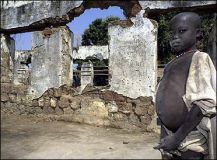International creditors focus on Sudan to aid post-war construction
OSLO, April 8 (AFP) — Sudan’s international creditors and some VIPs are to meet in Norway next week to collect funds for rebuilding the country, which is dealing with a major humanitarian crisis after the end of two decades of civil war.

|
|
A young boy wanders amidst ruins in Rumbek’s central market. Rumbek is due to become the temporary ‘capital’ of southern Sudan under a peace deal to be signed this weekend by the government and the main rebel movement.(AFP). |
Sudan requires some 7.8 billion dollars (six billion euros) by the end of 2007 for reconstruction and development spending in the wake of a peace accord in January between the government and rebels which ended 21 years of conflict in Sudan’s south.
Most of the money is to come from Sudan’s own oil resources, according to a report compiled last month by representatives from the government and ex-rebels, but some 2.6 billion dollars is to be provided by the international community.
UN Secretary-General Kofi Annan, US Deputy Secretary of State Robert Zoellick and some 60 national delegations will attempt on Monday and Tuesday to do their part in solving Sudan’s financial predicament.
“We of course would like to see as much generosity from donors as possible,” conference host Hilde Frafjord Johnson, Norway’s minister for development aid, told AFP.
“In view of the fact that the Sudanese will put up a lot of domestic funding themselves, which is very unique (…) the international community should come up with the necessary funds,” she said.
The conflict in southern Sudan claimed at least 1.5 million lives.
Of a total of 4 million displaced people from the conflict, some 500,000 are reported to have already returned and they are the priority for aid.
“People are voting for peace with their feet,” said Frafjord Johnson. “They have been walking for four to five months from Khartoum and there is nothing for them. They have to use straw, there is not even a tent field”.
“It is a very, very critical situation,” she said.
Clearing the countryside of landmines, rebuilding infrastructure and the de-mobilisation of soldiers are the next priorities.
The conference, to which Sudan is sending Vice President Ali Osman Taha, and John Garang, the head of the country’s former rebels, comes as the international community is putting pressure on Khartoum to solve a humanitarian crisis in Darfur, a western province of the country.
Marked by mass killings, torture, rape and pillage, the Sudanese government’s two-year-old scorched earth campaign against ethnic minority rebels in Darfur has left more than 300,000 dead and 2.4 million people displaced, according to a British parliament report.
The UN Security Council last week adopted a resolution to allow suspected Darfur war criminals to be tried by the International Criminal Court in The Hague.
Two days later, Sudan’s President Omar al-Beshir solemnly swore “thrice in the name of Almighty Allah that I shall never hand any Sudanese national to a foreign court.”
But Frafjord Johnson said Sudan’s stance should not prevent the international community from digging deep into its pockets immediately.
“The people in the south can be hostage to Darfur and (…) carry a double burden because now they’ve had the same burden as the Darfur people and they risk suffering even longer when peace has come because of the continuation of the same policies in other areas of the country,” she said.
“If they come back and there’s nothing for them, tensions can increase in the south,” she added.
Creditor nations will be able to determine how their funds are employed, ensuring that their money is not used in any way to fuel the Darfur conflict.
